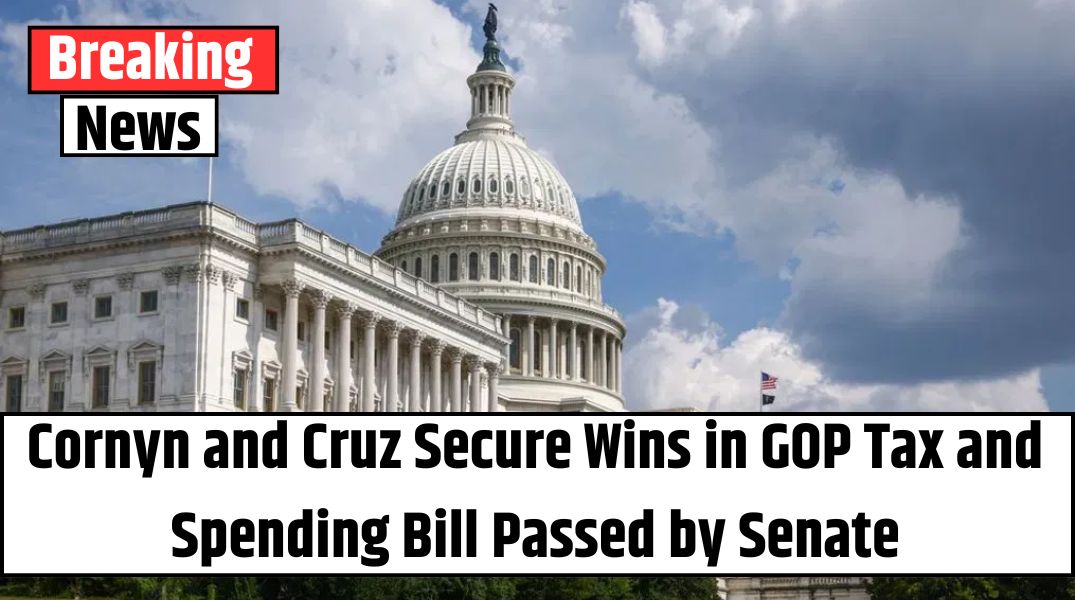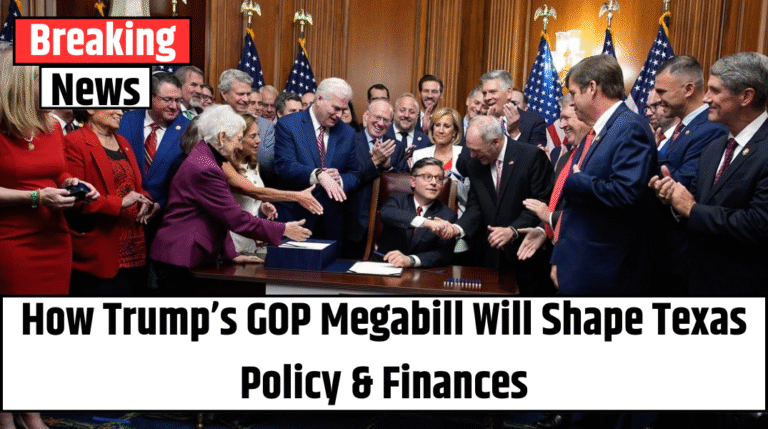Cornyn and Cruz Secure Wins in GOP Tax and Spending Bill Passed by Senate
WASHINGTON, D.C. — After an intense 26-hour stretch of negotiations and floor debate, the U.S. Senate has passed its version of a massive Republican tax and spending overhaul, bringing President Donald Trump’s legislative priorities one step closer to reality. But despite Senate approval — with Texas Sens. John Cornyn and Ted Cruz voting in favor — the bill now faces stiff resistance as it returns to the House.
Dubbed the “One Big Beautiful Bill,” the legislation combines broad cuts to federal programs with several high-profile Republican initiatives, echoing Trump’s economic vision.
What’s In the Bill?
The Senate version mirrors many elements of the original House bill, passed in May, but with several key changes. Among the most notable provisions:
-
$13.5 billion in federal reimbursements for border security efforts by states, including Texas’ Operation Lone Star. Cornyn championed this provision, boosting the amount from the House’s $12 billion.
-
Elimination of federal taxes on certain firearms and suppressors.
-
A NASA directive encouraging consideration of relocating the retired Space Shuttle Discovery to Houston.
-
Creation of $1,000 “Trump Accounts” for all American children, to be used for education, home down payments, or starting a business — a signature initiative led by Cruz.
-
A $1,700 annual tax credit for donations to nonprofit school scholarship organizations, a major win for school choice advocates.
Additionally, the bill would roll back clean energy tax credits introduced in the 2022 Inflation Reduction Act (IRA), a sticking point with hardline House Republicans.
AI Clause Sparks Backlash, Then Gets Removed
One of the most contentious elements came from Sen. Cruz: a provision banning state-level AI regulation for 10 years in exchange for access to a $500 million federal AI fund. Facing fierce opposition from fellow Republicans — particularly Sen. Marsha Blackburn — Cruz ultimately joined 98 other senators to strip the clause after a compromise attempt failed.
Tensions in the House: Texas Conservatives Push Back
Although the bill now heads to the House, its path forward is far from guaranteed. Key members of the House Freedom Caucus, including Texas Reps. Chip Roy (Austin) and Keith Self (McKinney), have expressed frustration with the Senate’s changes — particularly what they view as insufficient cuts to the IRA’s green energy tax breaks.
Roy, a vocal critic of renewable energy subsidies, dismissed Trump’s July 4 signing deadline, calling it “political theater.” He’s demanded a full repeal of the clean energy credits, arguing they prop up unreliable energy sources and benefit Chinese manufacturers.
“If leadership wants my vote, they’ll have to fix it,” Roy said.
Texas at the Center of the Debate
Texas plays a central role in both the political wrangling and the stakes of the legislation. As the nation’s leader in wind and solar energy production, any rollback of clean energy incentives could ripple across the state economy.
Also Read – Texas Family Faces $1,400 Bill for Measles Vaccine Needed to Protect Boy
Trade groups have warned that altering or scrapping the credits could derail major energy projects, cost jobs, and raise consumer electricity prices.
“Texas could lose billions in investment and tens of thousands of jobs,” warned Harry Godfrey of Advanced Energy United. “This is a direct hit to communities relying on clean energy growth.”
Other Flashpoints
-
Rep. Troy Nehls (R-Richmond) voiced disappointment over a watered-down Senate provision taxing private university endowments. While the House capped the tax at 21%, the Senate reduced it to just 8%.
-
Still, Nehls admitted he might support the bill if asked directly by Trump, calling the former president’s backing a “game-changer.”
Meanwhile, House Democrats remain firmly opposed to the bill, pointing to cuts to Medicaid and benefits for high earners as deeply unfair.
Rep. Greg Casar (D-Austin) blasted Vice President JD Vance — who cast the deciding Senate vote — for betraying working-class Americans.
“When it came down to it, he voted to gut Medicaid and hand tax breaks to the rich,” Casar said.
What’s Next?
Speaker Mike Johnson (R-La.) has vowed to maintain the July 4 timeline, despite growing doubts among House Republicans.
“The American people gave us this opportunity,” Johnson said in a statement. “We intend to deliver — without delay.”
But with the GOP’s slim House majority, even a handful of defectors could derail the bill. Roy and other conservatives are already signaling they won’t cave easily.
“I won’t be pressured into voting for a broken bill just to meet a political deadline,” Roy said.







